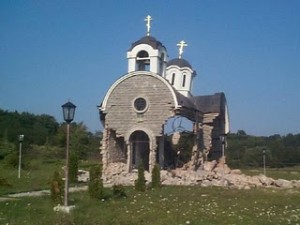Belgrade, Pristina, Budapest, January 22, 2013
 |
| Serbian churches have been targeted in Kosovo. |
Since this month's Orthodox Christmas assailants attacked a monastery, set on fire a chapel and wooden crosses, and destroyed over 100 Orthodox tombstones, reported Belgrade-based Balkan rights group Centar 9.
The clashes are linked to anger within Kosovo's mainly Muslim Albanian population about the removal of a memorial to fallen fighters in neighboring Serbia.
Thousands of ethnic Albanians protested after some 200 masked Serbian police officers backed by armored personnel carriers removed the monument Sunday, January 20, in the town of Presevo.
It bore the names of 27 ethnic Albanian fighters killed during the 2000 conflict in the Presevo Valley, a spillover from the 1999 war in Kosovo, Serbia's former province.
ALBANIAN ARMY
Local media reported that the 'Albanian National Army'
group asked supporters on social website Facebook to
retaliate by "hitting the Serbs where it hurts them
the most," an apparent reference to churches and
other religious sites.
Soon after, dozens of men were seen marching to the
Serbian monastery
'Assumption of the Holy Mother of God' in Kosovo, which
was recently rebuild after being demolished in a 2004
demonstration.
Kosovo police, backed by international police and
peacekeepers, dispersed the crowd after they threw stones
and firecrackers in last Sunday's unrest, witnesses
said.
Elsewhere, a small chapel was set on fire at an Orthodox
graveyard in the ethnically mixed village of Milosevo,
while in Priluzje village unknown attackers burned several
wooden crosses and exploded a large tombstone, Centar 9
told BosNewsLife.
The January 20-21 unrest also saw the destruction of
dozens of Orthodox tombstones, including 27 in Klokot
village, Centar 9 said.
MORE VANDALISM
Several Orthodox graveyards and tombstones were also
vandalized in the villages of Orthodox Christians in
Kosovo face uncertain future.
Priluzje, Miloseva, Plemetina and Suvo Grlo, in Srbica
county, according to rights investigators.
Adding to tensions, at least one gun was fired at a
Serbian monument to "the victims of 1999 NATO
[military alliance] bombing" which was aimed at
forcing Serb forces to end a crackdown on independence
seeking ethnic Albanians.
The monument also remembers Serbian children killed in
ethnic clashes in 2003 near the Bistrica river, Centar 9
said.
"This [shooting] incident greatly disturbed thousands
of Serbs still living in this area," the group
explained.
Tensions have risen since earlier this month 56 Orthodox
tombstones were destroyed at the Kosovo Polje graveyard,
"in the midst of Serbian Eastern Orthodox
celebrations of Christmas holidays," explained Centar
9.
KOSOVO POLICE
Kosovo police has been blamed for playing down the
violence by reportedly saying the Christmas incident
happened at the same location of previous graveyard
vandalism. "The incident occurred in Kosovo Polje, in
central Kosovo, and not in the village of Makarabe,"
as claimed by police, Centar 9 said.
United Nations representatives condemned the
attacks.
Fewer than 100,000 Serbs, many of them Orthodx Christians,
have remained in Kosovo following a post-war exodus of
non-Albanians. They live in separate areas watched over by
NATO peacekeepers.
Western diplomats have expressed frustration over the slow
progress towards reconciliation among the different
groups. Kosovo, which broke away and later declared
independence from Serbia in 2008, is recognized by some 90
nations, but not Serbia and its key ally Russia.
Belgrade has proposed autonomy for ethnic Serbs in
northern Kosovo in exchange for supporting Kosovo's bid to
join the United Nations. Pristina rejects these
conditions.
By Stefan J. Bos, Chief International Correspondent
BosNewsLife
BosNewsLife
